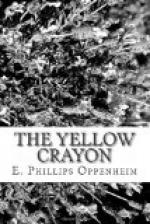“Treat me as being so, at any rate,” Mr. Sabin said.
“I am pardoned,” Passmore said, “for speaking plainly of family matters—my concern in which is of course purely professional?”
Mr. Sabin looked up for a moment, but he signified his assent.
“You left America,” Passmore said, “in search of your wife, formerly Countess of Radantz, who had left you unexpectedly.”
“It is true!” Mr. Sabin answered.
“Madame la Duchesse on reaching London became the guest of the Duchess of Dorset, where she has been staying since. Whilst there she has received many visits from Mr. Reginald Brott.”
Mr. Sabin’s face was as the face of a sphinx. He made no sign.
“You do not waste your time, sir, over the Society papers. Yet you have probably heard that Madame la Duchesse and Mr. Reginald Brott have been written about and spoken about as intimate friends. They have been seen together everywhere. Gossip has been busy with their names. Mr. Brott has followed the Countess into circles which before her coming he zealously eschewed. The Countess is everywhere regarded as a widow, and a marriage has been confidently spoken of.”
Mr. Sabin bowed his head slightly. But of expression there was in his face no sign.
“These things,” Passmore continued, “are common knowledge. I have spoken up to now of nothing which is not known to the world. I proceed differently.”
“Good!” Mr. Sabin said.
“There is,” Passmore continued, “in the foreign district of London a man named Emil Sachs, who keeps a curious sort of a wine-shop, and supplements his earnings by disposing at a high figure of certain rare and deadly poisons. A few days ago the Countess visited him and secured a small packet of the most deadly drug the man possesses.”
Mr. Sabin sat quite still. He was unmoved.
“The Countess,” Passmore continued, “shortly afterwards visited these rooms. An hour after her departure Duson was dead. He died from drinking out of your liqueur glass, into which a few specks of that powder, invisible almost to the naked eye, had been dropped. At Dorset House Reginald Brott was waiting for her. He left shortly afterwards in a state of agitation.”
“And from these things,” Mr. Sabin said, “you draw, I presume, the natural inference that Madame la Duchesse, desiring to marry her old admirer, Reginald Brott, first left me in America, and then, since I followed her here, attempted to poison me.”
“There is,” Passmore said, “a good deal of evidence to that effect.”
“Here,” Mr. Sabin said, handing him Duson’s letter, “is some evidence to the contrary.”
Passmore read the letter carefully.
“You believe this,” he asked, “to be genuine?”
Mr. Sabin smiled.
“I am sure of it!” he answered.
“You recognise the handwriting?”
“Certainly!”




